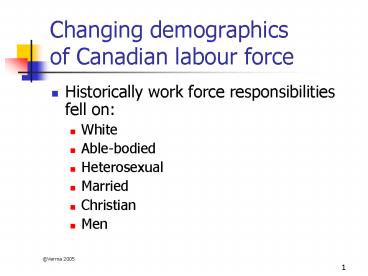Changing demographics of Canadian labour force - PowerPoint PPT Presentation
1 / 18
Title:
Changing demographics of Canadian labour force
Description:
Labour Force: Those 15 years & older, employed and unemployed (looking for work) ... Aberrant incident. Employee suspects discrimination & can file a complaint ... – PowerPoint PPT presentation
Number of Views:48
Avg rating:3.0/5.0
Title: Changing demographics of Canadian labour force
1
Changing demographics of Canadian labour force
- Historically work force responsibilities fell on
- White
- Able-bodied
- Heterosexual
- Married
- Christian
- Men
2
Workplace designed to meet needs of this group
- Implications of changing demographics
- People who are different?
- Having mothers fathers in labour force?
- People of different religious observance?
- Opening homosexual employees?
- Persons with disabilities?
3
Demographic quiz
- Some definitions
- Labour Force Those 15 years older, employed
and unemployed (looking for work) - Labour Force Participation Rate proportion of
group who are in labour force - Visible minorities Non-white by colour,
non-Caucasian by race - Aboriginal peoples Status and non-status,
Metis, Inuit - Persons with disabilities Lacking a major life
function
4
Changing demographics
- Affect pool of available labour
- Direct impact on effectiveness of many HR
functions - Legislative response to
- Ensure fairness
- Overcome past discrimination
5
(No Transcript)
6
Charter of Rights FreedomsEquality section
(Section 15)
- 15(1) Every individual is equaland has
right(s)without discrimination based on race,
national or ethnic origin, colour, religion, sex,
age, or mental or physical disability. - 15(2) (The guarantee of equality) does not
preclude any law, program or activity that has as
its objective the amelioration of conditions of
disadvantaged individuals or groups including
those that are disadvantaged because of .
7
Comparison Individual and systemic
discrimination
- Individual
- Aberrant incident
- Employee suspects discrimination can file a
complaint - Remedy Make person whole
- Liability begins at time of complaint
- Focus Past
- Complaint-based
- Systemic
- Operation of system
- Discrimination is often subtle difficult to
see - Remedy Usually more than one way
- Period of time required to identify and correct
- Focus Future
- Pro-active (may have complaint component too)
8
Federal compared to Provincial legislation
- All organizations covered by one or other
- Federal legislation covers
- Federal Crown Corporations
- Federal public service and agencies
- Federally regulated industries
- Banking, communications transportation
9
Provincially regulated organizations
- Any organization which is NOT federally regulated
- Private sector organizations not in federally
regulated industries (these companies must obey
legislation in each province in which they
operate) - Provincial Crown Corporations
- Provincial civil service
- Broader public sector
- E.g., Municipalities, hospitals and universities
10
Come together Supreme Court
- Supreme Court decisions
- Decisions in one jurisdiction affect other
jurisdictions - E.g., Manitoba Human Rights case said
discrimination on the basis of pregnancy covered
by prohibition of discrimination on basis of
gender - Cannot discriminate on basis of sexual
orientation
11
Comparison between human rights, EE Diversity
12
(No Transcript)
13
(No Transcript)
14
Most Controversial aspects
- Duty to accommodate (Human rights and EE)
- Data collection (EE) see questions
- Setting goals (goals vs targets) (EE)
- Assumption that hiring unqualified people
- Special measures (EE)
15
EE workforce survey questions
- Are you female or male?
- Are you
- a. an Aboriginal person or
- b. a member of a visible minority (e.g., Asian,
Black, Chinese, East Indian), or - c. white
- 3. Do you consider yourself to have a disability
which prevents you from using a major life
function (e.g., blind, missing a limb, learning
disability)? Yes No
16
Harassment
- Sexual
- Gender
- Race
- Disability
- Sexual orientation
- Etc. protected groups under human rights
17
Sexual harassment
Clearly Acceptable Behaviour
Clearly unacceptable behaviour
GRAY AREA exists because everyone draws a line
between acceptable unacceptable behavior at a
different place
18
Building Block for Diversity Culture
Rules for right behaviour (norms) Norms teach
us what is right in our culture which leads us
to believe that our culture is right
Feels omni-present Unaware of extent our
others behaviours are influenced by culture
Learned much of what is assumed to be human
nature is culturally learned































